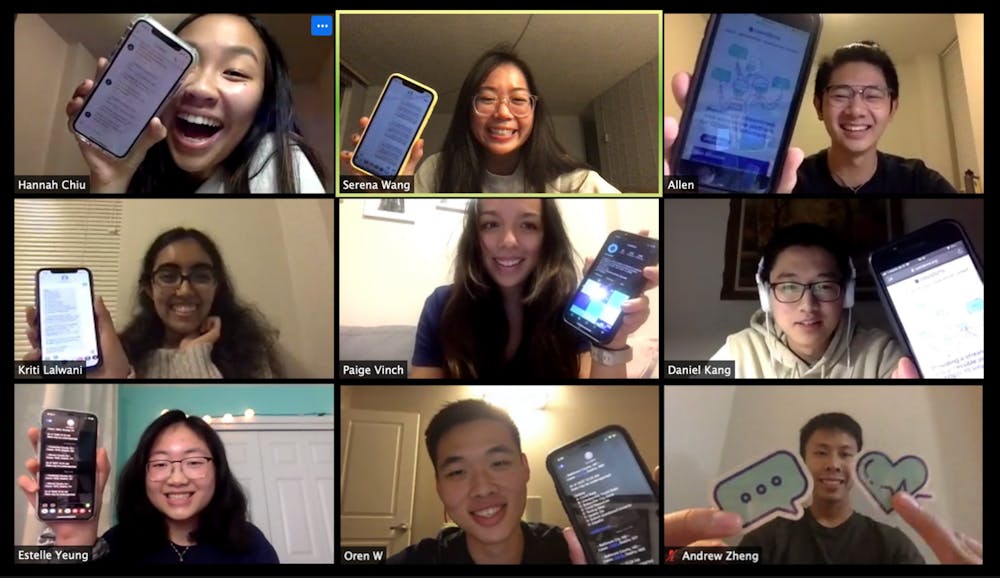A group of Hopkins seniors have teamed up with students across the country to create CovidSMS, a short message service (SMS) platform aimed at eliminating disparities associated with the COVID-19 pandemic. Since its inception in March, CovidSMS has received over $10,000 in grants and is currently a finalist for the Robert Wood Johnson Foundation Challenge.
Three of the four project leads, Serena Wang, Hannah Chiu and Andrew Zheng recently sat down for a Zoom meeting with The News-Letter to discuss the organization’s origins and mission.
CovidSMS began as a platform for individuals to receive COVID-19 news and updates about their region using SMS, which doesn’t require an internet connection. The decision to create a text platform rather than an email platform was deliberate.
“We saw there was a discrepancy in low-income communities. They didn’t have readily available access to the internet or smartphones. So, we basically saw using SMS as a way to provide COVID information,” Zheng said.
While 71% of low-income Americans have access to a phone, only 54% have access to a computer. With so much of American life becoming virtual, it is extremely difficult for those without internet access to find quality public health information, but it also provides a niche that the CovidSMS team sought to fill.
Upon texting a ZIP code to a number, anyone can receive information about case counts, testing sites and unemployment resources. The platform has since expanded beyond its original mission to partner with organizations such as Family Rescue Center, Covaid and the City of San Jose.
Using CovidSMS these organizations are able to reach their contacts via mass text announcements. For example, if a food pantry wants to post their pickup hours or announce a new item is in stock, they can use CovidSMS to reach all of their contacts at once.
“There was one man experiencing homelessness that we talked to that was going to the laundromat to watch TV and get information,” Wang said. “Stories like these really inspire us.”
In addition to mitigating the digital divide through its program, the CovidSMS team also takes it upon themselves to educate their partners and the public about these inequalities. According to Chiu, the team attempts to format the texts to be as accessible as possible.
“We tried to ask our partners to also take into consideration that the person they’re trying to send this information to might not have access to be able to click on a link,” Chiu said.
CovidSMS began in March 2020 when the six founding members participated in a hackathon sponsored by the Hopkins Center for Bioengineering Innovation and Design. Before the hackathon began, the team members reported already being attuned to digital disparities. For example, Chiu volunteers for Hopkins Community Connection at a health clinic, and Wang worked with Health Care for the Homeless in downtown Baltimore.
“We were exposed to a lot of the discrepancies when it comes to access to literacy and technology,” Wang said.
That exposure led the team to create CovidSMS during the five-day hackathon. From over 1,200 contestants in 25 countries, CovidSMS became a finalist.
Since that hackathon CovidSMS has grown to include 20 team members from across the country, and it is currently managing partnerships with five organizations. In terms of moving forward, the team acknowledges that COVID-19 will not be going away anytime soon and neither will the digital divide.
“There will continue to need to be announcements [on lockdowns and reopenings],” Chiu said when she described the organization’s role in the approaching third wave of cases in America. “Those announcements will need to be location-specific.”
In addition, the team members all acknowledge that their platform is being used by nonprofits and community resource centers for more than just COVID-19 information even at the present moment, suggesting that CovidSMS will continue to have an important role in community outreach even after the pandemic has ended.
Chiu also reflected on what the experience means to her personally.
“I feel like my favorite part of this project is we’ve all learned a lot,” Chiu said. “In talking to communities, we have learned so much about our privilege to be able to Google something. I sit here all day, I get notifications, and the news comes to me. I’ve learned a lot about the flip side of that.”
To learn more about CovidSMS, you can visit their website (covidsms.org), their Instagram (@covidsms) or their Facebook page. To receive messages from CovidSMS, you can text your ZIP code to (888) 414-5539.





